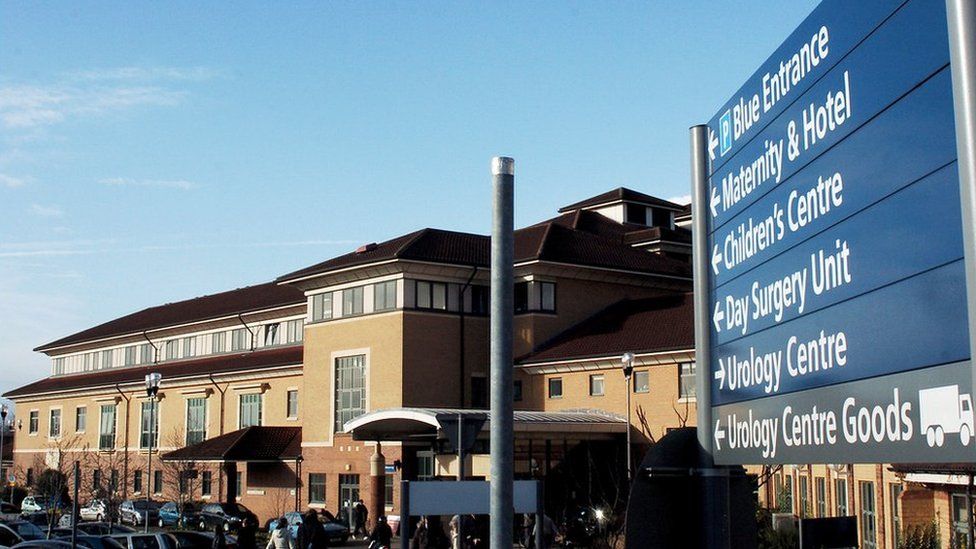
The review is looking into cases at Nottingham University Hospitals (NUH) NHS Trust, which runs City Hospital and the Queen’s Medical Centre
By Michael Buchanan & Liam Barnes
BBC News
A review into failings in maternity care in hospitals in Nottingham is set to become the largest in the UK, the BBC understands.
Donna Ockenden, chair of the inquiry, is expected to announce that 1,700 families’ cases will be examined.
She was in charge of the probe into services in Shropshire, which found at least 201 babies and mothers might have survived had they received better care.
The review comes after dozens of baby deaths and injuries in Nottingham.
It focuses on the maternity units at the Queen’s Medical Centre and City Hospital.
So far, 1,266 families have contacted the review team themselves directly and to date, 674 of these have given consent to join it.
But Ms Ockenden has called for a “radical review” to ensure “women from all communities” were being contacted by the trust and “felt confident” to come forward.
The families had asked for the Department of Health and Social Care, NHS England and the trust to agree to change the review from “opt-in” to “opt-out”.
Image source, LDRS
Maternity services run by NUH were rated inadequate after an inspection in 2020
NHS England has now written to affected families, confirming cases will be dealt with on an opt-out basis, with families having to opt out of giving consent.
Later, Nottingham University Hospitals (NUH) Trust chairman Nick Carver will speak at its annual meeting, and will acknowledge more must be done to gain the trust of families and communities.
He will also commit “to working collaboratively to plan for an apology on behalf of the board that the families recognise as meaningful”.
He previously said the trust would publicly apologise to people who experienced failings in maternity care.
‘Trust and transparency’
Anthony May, NUH chief executive, said Monday’s meeting would be “a very important milestone”.
He told BBC Radio Nottingham he had been meeting some of the mothers, and described their accounts as “very harrowing”.
“When I hear those stories it makes me very sad and very determined to improve things in the hospitals,” he said.
“Today what we want to do is signal that we want a new relationship with the families built on trust and transparency, and try to understand how they can help us improve things in the maternity services.
“I would like to say that I think they’re really brave, I think they’re very persistent, and the fact that we’ve got to where we are with the review is largely down to their efforts.”
Though he apologised after taking over the job last year, Mr May said a full apology on behalf of the NUH board would be done “on the family’s terms”.
He also said staff in the maternity services “work incredibly hard”, adding: “It’s the trust that’s let them down.”
Mr May said the trust had “made improvements” regarding equipment and staff training, adding more doctors and midwives are “in the pipeline”, including some staff from overseas.
“The signs are there that slowly we are improving, but we have a mountain to climb,” he said.
Donna Ockenden said there was not “anywhere near a representative sample” of families
Ms Ockenden’s previous review in Shrewsbury and Telford, which used the “opt-out” approach, included more than 95% of affected families.
The Nottingham trust wrote to 1,377 families at the end of November and the end of January.
The letters went to families who had experienced stillbirth, neonatal deaths, brain damage to the baby, harm to mothers or relatives of mothers who died.
But only 360 families responded to these letters.
In total, 28% of white women contacted responded, while for black and Asian women, the figures were 10% and 5% respectively.
In Nottingham, only about 25% of families known to be affected have been included in the review.
Ms Ockenden said: “As it stands, with our 674 families who have joined the review, I can’t say as the chair we have anywhere near a representative sample of the rich diversity that we know exists in Nottingham.
“There is significantly more work to do.”
Follow BBC East Midlands on Facebook, on Twitter, or on Instagram. Send your story ideas to eastmidsnews@bbc.co.uk
Related Topics
Related Internet Links
The BBC is not responsible for the content of external sites.








